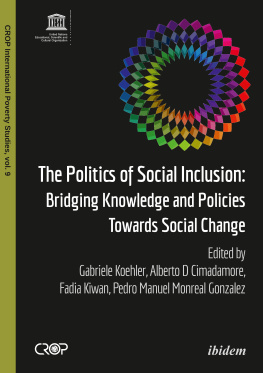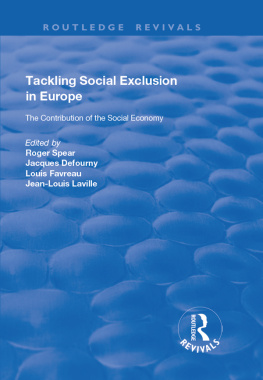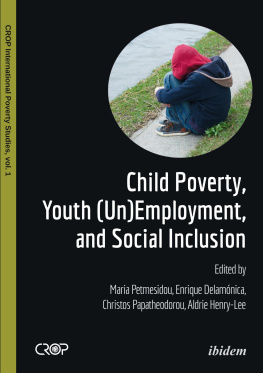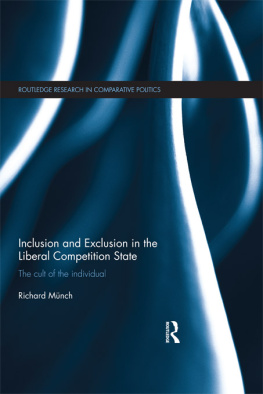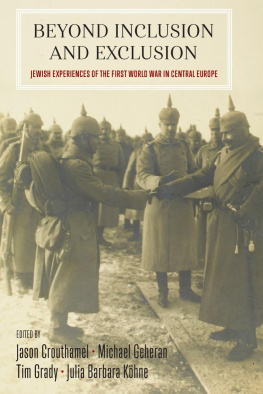INCLUSION AND EXCLUSION: UNEMPLOYMENT AND NON-STANDARD EMPLOYMENT IN EUROPE
Inclusion and Exclusion: Unemployment and Non-standard Employment in Europe
Edited by
JENS LIND
IVER HORNEMANN MLLER
First published 1999 by Ashgate Publishing
Reissued 2018 by Routledge
2 Park Square, Milton Park, Abingdon, Oxon, OX14 4RN
711 Third Avenue, New York, NY I 0017, USA
Routledge is an imprint of the Taylor & Francis Group, an informa business
Copyright Jens Lind and Iver Hornemann Mller 1999
All rights reserved. No part of this book may be reprinted or reproduced or utilised in any form or by any electronic, mechanical, or other means, now known or hereafter invented, including photocopying and recording, or in any information storage or retrieval system, without permission in writing from the publishers.
Notice:
Product or corporate names may be trademarks or registered trademarks, and are used only for identification and explanation without intent to infringe.
Publishers Note
The publisher has gone to great lengths to ensure the quality of this reprint but points out that some imperfections in the original copies may be apparent.
Disclaimer
The publisher has made every effort to trace copyright holders and welcomes correspondence from those they have been unable to contact.
A Library of Congress record exists under LC control number: 98073855
ISBN 13: 978-1-138-32054-3 (hbk)
ISBN 13: 978-0-429-45322-9 (ebk)
Contents
Jens hind and Iver Hornemann Mller
Part I
Freedom from work or freedom through work?
Erik Christensen
Helge Hvid
Part II
Perspectives on new forms of differentiation and inclusion
Pedro Hespanha
Rik van Berkel, Harry Coenen and Arjen Dekker
Leni Beukema and Ben Valkenburg
7. Non-standard employment, social exclusion, and the household: Evidence from Britain
Rosemary Crompton
Pete Alcock
Iver Hornemann Mller
Jens Lind
Part III
The European experience
Jens Lind and Iver Hornemann Mller
This book is the result of an ongoing research process involving rather many people over a number of years. A grant from the Danish Social Science Research Council in 1993 enabled the start of a joint research project on New structures and everyday life in the Centre for Social Integration and Differentiation (CID) at Copenhagen Business School. During the work with this project we came into contact with the then newly established European Network called Social Exclusion and the Development of European Citizenship (SEDEC) which later gave birth to a thematic network on Social Inclusion Policy and a research project on Inclusion and Exclusion in Social Policies and Everyday Experiences in Central and Peripheral Areas (INPART). Both the network and the research project are until the end of 1999 parts of the European Commissions work programme: Targeted Socio-Economic Research (TSER).
Our participation in these European fora has been both fruitful and stimulating, and also opened the opportunity to widen and strengthen co-operation among European researchers in the field of inclusion within work. One example was a European-wide conference in Lund, Sweden, in May 1996 where we arranged a workshop on Work and social integration. The papers given at this workshop are, after several revisions, the main part of this book.
We are grateful to both Danish and European sources of research funding for making these projects, meetings and seminars possible, and we are grateful to all our colleagues who in one way or the other have contributed to the process. We thank especially the participants in the Lund conference for valuable comments on the first drafts of the articles, and we thank the contributors to this anthology for their commitment and patience in the process of finalising the book.
Emeritus professor John Westergaard has been a great help in making linguistic improvements to parts of the text. Dr Kjell Eriksson, University of Lund, has shown great skill and experience in setting out the text for publication.
Jens Lind and Iver Hornemann Mller
July 1998
The main content of this book is about unemployment and non-standard employment and about policies aiming to reduce the social exclusion caused, among other things, by labour market marginalisation. Four European countries are in focus: Denmark, the UK, the Netherlands and Portugal. These countries to some extent represent the different types of welfare state regime in Europe: a Scandinavian, social-democratic model; a liberal, Anglo-Saxon model; a corporate, Bismarckian model; and a southern variant. The analyses intend to give a thorough insight into the variety of issues in recent labour market developments and a related overview of the major schemes and programmes to combat social exclusion.
On the one hand the variety of issues and policies underline the notion that there is no single and common pattern for exclusion and inclusion in Western Europe. National and regional specificities are still very much the case. On the other hand, however, we are able to identify some common traits in labour market developments and in the associated modes of social regulation. There is a clear trend to identify labour market marginalisation as a major social issue and to emphasise measures which activate the unemployed instead of just paying them benefits. The social implications of the latter are, however, not without ambiguities. One way of seeing it is that the unemployed and marginalised are provided with assistance from the welfare state in order to be re-included within an important social institution: namely working life. Another viewpoint is that this workfare policy is a disciplinary and punitive measure to maintain commitment to the work ethic, and that the South European unemployed should be happy not to be targets of this policy. The most radical alternative to the workfare policy is some sort of freedom from work in terms of citizens income or basic income scheme. Another strategy is to improve the quality of working life, through freedom at work.
The last two aspects are discussed in the first chapter of the anthology and should be seen as an underlying theme for the other articles, which present a range of national descriptions and analyses. In the last chapter of the book we offer a discussion of convergences versus national specificities and try to identify the contours of a West European labour market policy.
Jens Lind and Iver Hornemann Mller
JENS LIND AND IVER HORNEMANN MLLER
The restructuring of working life, unemployment and labour market marginalisation are among the most important social issues on the agenda in Western Europe. It is a common observation that changes in the world economy are taking place at a very high speed under influence of increasing globalisation of markets and the implementation of significant and revolutionary new technology. This process is furthered by the assumption and recommendation that national and regional economies have to avoid protectionism and instead keep up with these changes to secure competitiveness through more flexible production and a more flexible labour market.
There are many facets of this development and interpretations of the risks and opportunities are not at all unambiguous. From one point of view it seems that the industrialised societies are in a situation where human labour is being systematically eliminated from the production process (Rifkin 1995:3). This is in accordance with Habermas when he sees an end to the work-society and a shift of paradigm from that to the society of communication (Habermas 1984) and it echoes of course a main thesis of Gorzs in his Farewell to the Working Class (1982) with its identification of the non-class of non-workers.






